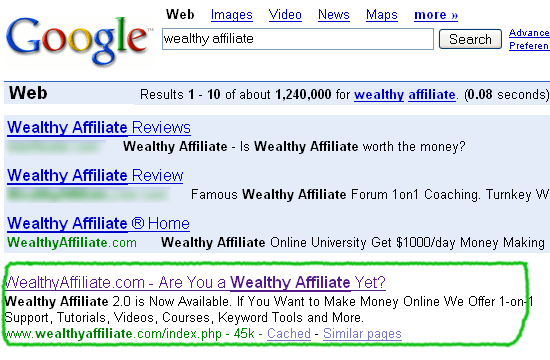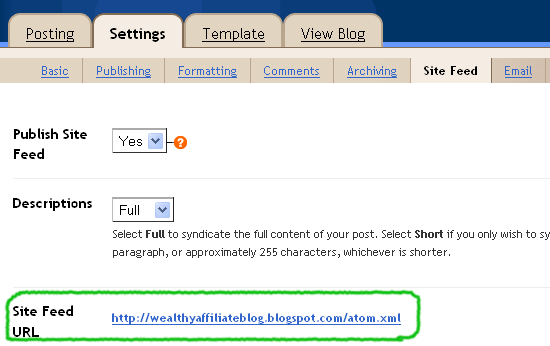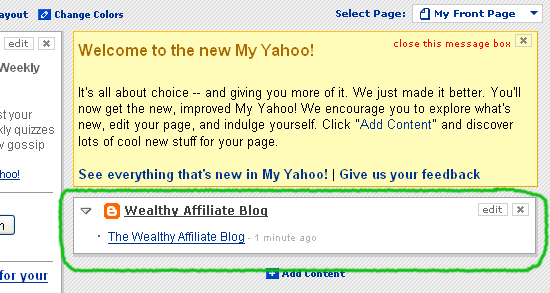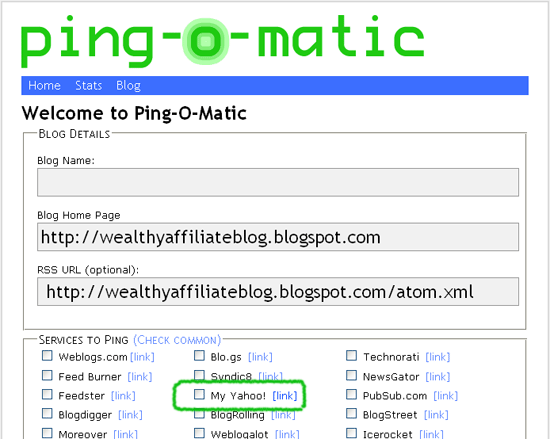Introduction to Search Engine Optimization (SEO)
Search engine optimization techniques have been around for years and successful marketers have been able to achieve top rankings for specific keywords. You can drive significant traffic to your website if you get a top ranking within the "natural" search engine results and it costs you absolutely nothing. This is why there is so much competition in the natural listings within the major search engines like Google, Yahoo, and MSN.
How can you get a chunk of the SEO pie? Maybe you’re just starting out with your first website, how can you get your site listed in the search engines and compete with the BIG boys that have thousands of listings throughout the Internet?
Getting a top listing under a keyword or phrase that is relevant to your web page can really increase the exposure that your page receives. Bottom line is that you can get a lot of highly relevant traffic, and we all know that relevant traffic means...more money in your pocket!
We also need to make sure that it is understood that SEO is not something that we as webmasters or Internet Marketers have full control over. You can make your page very targeted and use all of the best SEO techniques that you want and still not get listed. SEO is a game of chance, but this tutorial will give you an upper hand and provide you with as much "control" as possible. There are many factors and variables that are taken into consideration when a search engine ranks your site in their page index. The techniques we are going to talk about will give you the best possible chance of getting listed, but nothing is guaranteed in the SEO world.
How to get Listed Naturally in the Search Engines
So how do you go about getting listed in the search engines? Well there is much speculation about the algorithms that the search engines use to rank their top natural listings, but we can’t be sure for certain. First of all, Google, Yahoo, and MSN, have different ranking algorithms. It’s very common to see a top listing in Google, not at the top in Yahoo, and the same goes for MSN. When optimizing your website for SEO purposes there are a number of techniques that you can implement to give you the best chance of getting listed for all search engines. Let’s get into it.
The TRUTH About Meta Tags
There is a lot of discussion about meta tags and whether or not they are worth using. Some people “CLAIM” that meta tags are the reason why they are listed in the search engines. Well, we’ve got news for these people. Meta tags are one of the oldest SEO tags around and the top Search Engines know this. It only takes a minute to use a meta tag generator and produce the tags for your site. Don’t waste your time. Search engines today do not look at meta tags like they used to. The old search engines like metacrawler, even Yahoo in the OLD DAYS, used to look at meta tags, and webmasters could get top listings by simply including Keyword and Description meta tags. This doesn’t happen anymore.
People can spam via meta tags and include hundreds of keywords and descriptions that are not even relevant to the page. For this reason, the big search engines don’t consider meta tags as a basis for inclusion into their directories. The only tag that is important is the "Title" and “Description” tag. If you get a listing in a search engine, your title and description can help format your listing properly. Beware though, this doesn’t always work. Google will many times take the most relevant block of text on your page and use that for your natural listing. In other words, meta tags are a thing of the past and they don’t help much these days.
Content is Where it is AT!
Search engines rank sites based on relevancy. They realize that the more relevant their listings are, the more people will like their service and use them. Google is a prime example of this. The famous Google Bot which is in charge of spidering websites and adding them to the Google index is a lot smarter than it used to be. It looks over the content of your entire website, not just a single page. It will then determine what your website is relevant to and make a decision. It will decide whether or not to include your page in the natural listings or not. Upon choosing to add your site, it will then determine what keyword (s) to list it under and where it will be ranked within the results. This is where we as webmasters can fine tune our pages for the spidersSEO Checklist & Descriptions
Instead of writing an entire book on the topic of SEO, we’re going give you a list that you can use to help optimize your website.
Content
Regardless of how “pretty” your website is, content is what the search engine spiders look at. When a spider hits your page it is going to scan the entire website, including the links that you have on your page. It will determine if you meet the minimum content requirement to be listed in their directory. The content on your page needs to have some “BULK” to it . By this we mean that you should write multiple paragraphs on your page using relevant words to what it is that you want to be listed under. There is no SET number of keywords that you should use, but we recommend having at least 300-500 words on all of your web pages.
Having the right keyword density is one aspect of the SEO "game" that we can control. If you want your web page to be listed for the phrase “wealthy affiliate university review”, you need to make sure that this phrase appears multiple times within the text on your website. A keyword density of between 2% and 5% is a general rule that you can follow. This will make the focus keyword/phrase apparent to the search engine spiders and will get you a better chance of being listed for this keyword.
Multi-Page
Having a multi-page site is becoming more and more important to the search engines. Single landing pages with no links to other pages on the same domain are very rarely listed in top positions. Make your page a multi-level site. All you need to do is create a number of relevant web pages, and link them all together.
Title:
The title tag of your website is VERY important and many people will tell you that a good title can make or break your chance of being listed. You ALWAYS want to have your focus keyword/phrase in the title of your page. When you do get listed, the search engines use the title tag as the first line of the listing. So make sure your title is catchy and highly relevant to what your focus keyword is.
Inter-linking and link exchanges were very popular a few years ago when there was a LOT of buzz about Page Rank and how many people link to your website. These days, PageRank has VERY little to do with search rankings. Google and Yahoo figured out that link farms and exchanges were affecting their listings. You could literally pay people to link to your website and get a top listing. These days are over. Incoming links to your page do still play a roll in your search listings, but it is nothing like it used to be. It is important that when you do get links, you work on "one-way" links...or pages that only link to your site, not link back. Also, make sure that you aim to get links to your page on relevant websites. A good way to do this is through industry partners, forums, and social bookmarking websites.
Focus Keywords:
Make sure that your focus keywords do not have millions of previously indexed sites. Your chances will be very low if you are trying to get a top listing for a saturated and highly competitive keyword.
Choosing Focus Keywords
So, how to you choose a focus keyword with the hopes of being included in the search engines? Here’s a technique you can use.
Go to Google, type in your keyword in "quotes" (also known as exact match). Let’s suppose you have a website and you want to get listed for the keyword phrase “Wealthy Affiliate School ”. You will see that there are very few indexed pages for this keyword, 3 to be exact (at the time of writing this).
Choosing focus words with "results" under a 5,000 give you a much better chance of getting a top listing then if the search term has millions of results. Keep this in mind when you are creating your pages with the intent on getting listed in the search engines. The keyword "Make Money" has over 3 million results. Getting a top listing for this focus word is very highly unlikely.
Another Example of a Top Listing:
Below is the Wealthy Affiliate Homepage in the top position for the keyword "wealthy affiliate". We have included the statistics of the indexed page for you to look at below. Note that the homepage has 2400 keywords with a density of 2.15%.

Stats for the page above:
| Html | # of Keywords | Total | % |
| Title | 1 | 7 | 28.57 |
| Visible Text | 26 | 2409 | 2.15 |
| Image Tags | 4 | 134 | 5.97 |
| Domain Name | 1 | 1 | 200 |
| Meta Description | 1 | 17 | 11.76 |
Also, we should mention that the Wealthy Affiliate homepage is a multi-level page that links to more 10 or more pages on the same domain. Google loves this!
Get Listed in 5 Days or Less - Blog + Ping Technique
OK, now we’ve talked about these “spiders” that the major search engines send out to find your website and add it to their index, but how do you get a spider to crawl your website?
I’m sure you’ve heard about “blogging” and pinging. The programs that are out there that “do the work for you” are a dime a dozen. Don’t bother wasting your time or money buying one. Just do the work manually, it only takes 5 minutes to get your own blog up and running, and then takes another 5 min tues to set the rest of the technique up. So let’s get started.
Step 1: Go to www.blogger.com and create a free blog if you don’t already have one. This step should take you no longer than 5 minutes to complete. Once you have your blog you can use it over and over again for this technique.
Step 2: Within your blog admin panel, click the “settings” tab, then click on “Site feed”. You need to copy the site feed URL because we’re going to use it in the next step.

Step 3: Log into your My Yahoo account (Set one up first if you don’t have one my.yahoo.com).
Step 4: Edit your front page. You can add an RSS feed to your yahoo front page so that your blog posts show up in your my.yahoo.com area. To do this click the “Add Content” button on you’re “My Yahoo home” page. Then click the “Add RSS by URL” link to the right of the “Find Content” box that is displayed on the next page. Paste your Site Feed URL into this and you’re done!

Now each time you make a post on your blog and include the URL of your web page the yahoo spiders will crawl it. We’ve had sites indexed into the search engines in a matter of days using this exact technique. Your “My Yahoo Home” page will look like this:

Step 5: visit www.pingomatic.com and enter your Blog Site Feed url into the "RSS URL" box. Make sure that the "My Yahoo" box is selected, then click "Send Pings". This will notify your My Yahoo account that your blog should be included. Yahoo will then send out a spider very soon to crawl your blog. Your blog has a link to your website and it will get spidered too! See the screenshot below.

SEO & Google Adwords
Many people are experiencing that it is getting harder and harder to advertise on the Google Adwords paid search network. This is because Google is doing a great job of cutting down on content spam and poor quality websites. They realize that by doing this it will increase the user experience at Google. All of the techniques that we’ve mentioned in this tutorial in terms of creating an optimized page should also be implemented on your landing pages that you advertise within Adwords.
Google checks your landing page when you create an ad, and if it isn’t highly relevant to the keywords within your ad groups, you are going to have to pay an arm and a leg to advertise.
For instance, if you want to advertise the keyword “Wealthy Affiliate University”, you better make sure that your web page has the keywords “Wealthy Affiliate University”on it . As mentioned earlier, we call this the “Focus Keyword”. In Adwords terms we call this the “Common Keyword”. If your ad groups are setup using the Common Keyword Technique and your landing page use this common word as the Focus keyword, you’ll be much less likely to be hurt by an Google Slap!
Conclusion
If you think about it, Search Engine Optimization isn’t rocket science. The main trend that is working right now on the Internet is to simply offer your users unique and relevant content. Relevancy rules the Internet right now and it’s only going to get more strict. The days of having a single, stand-alone landing page are gone, and it’s time to offer the “full” package on your websites. Multi-page , highly relevant and original content, focus words, and a powerful title are among the most important SEO tactics that you can implement.
Each time you write an article, or a sentence for your landing pages, have these SEO techniques in mind. By including SEO techniques on all of your web pages you will not only give yourself a chance of being listed for free in the search engines, it will help you to follow the Google Adwords landing page relevancy requirements and get the lowest possible bid prices.





7 comments:
The team’s professional capabilities, industry knowledge, buy niche edits, and outstanding customer service continue to inspire trust.
Just take a look at this website. I just searched from my domestic website however the complete credit score goes to them. on-page seo service
I know this is quality based blogs along with other stuff.
Niche Edit
I would strongly recommend them to anyone, and we will definitely work with them again in the future.
UI design company
They helped expand the product offering through great design thinking and implementation.
branding companies in San Francisco
Thanks meant for sharing this type of satisfying opinion, written piece is fastidious, that’s why I’ve read it completely.
best app design company
You create sense out of the foremost complex topics.
best UX agency
Post a Comment